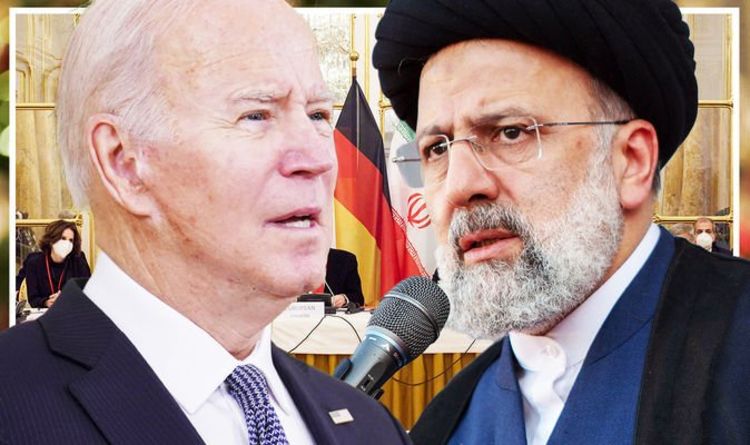Iran: Expert hints at possibility of war with the west
We use your sign-up to provide content in ways you’ve consented to and to improve our understanding of you. This may include adverts from us and 3rd parties based on our understanding. You can unsubscribe at any time. More info
The drills will be considered during a meeting between US military officials and Israeli Defense Minister Benny Gantz scheduled for Thursday. While the US official declined to discuss details of the potential exercises, a report by Israel’s Kan broadcaster earlier on Wednesday suggested they would involve “dozens” of aircraft – including F-35, F-16 and F-15 fighter jets, reconnaissance planes and refuelling tankers.
The news comes as Iran sits down with the so-called P4+1 countries in Vienna to discuss the notion of the US re-joining the nuclear deal known as the Joint Comprehensive Plan of Action, or JCPOA.
Former US President Donald Trump left the JCPOA in May 2018 and re-imposed the anti-Iran sanctions that the deal had lifted.
He also placed additional sanctions on Iran under other pretexts not related to the nuclear case as part of his “maximum pressure” campaign.
Iran has stated that Mr Biden must lift all sanctions to a verifiable effect before it will allow Washington to re-join the diplomatic accord.


The European Union is backing diplomacy over any military action.
High Representative of the EU for Foreign Affairs and Security Policy Josep Borrell following a call to the Iranian Foreign Minister said: “I conveyed a sense of urgency: we need to advance much quicker in the negotiations to restore the deal.”
Speaking of the upcoming talks, French Foreign Minister, Jean Yves le Drian sounded unoptimistic over a deal this time around.
He said: “The elements… are not very encouraging,”
The Minister added: “We have the feeling the Iranians want to make it last and the longer the talks last, the more they go back on their commitments… and get closer to capacity to get a nuclear weapon.”


The US is not present in the talks, however, there is hope this may soon change.
US State Department spokesman Ned Price told reporters on Wednesday that the Biden administration’s special envoy on Iran, Robert Malley, and his delegation “will plan to join the talks over the weekend”.
Tel Aviv has stated that it is willing to act alone and take pre-emptive measures against Iran in an attempt to derail the JCPOA talks.
Israel has been accused by Tehran of a series of events in the country.
The assassination of top scientist Mohsen Fakhrizadeh was largely blamed on Tel Aviv, as well as a series of sabotage events in Iran’s nuclear facilities.
Although Israel has never formally admitted or denied involvement, former Mossad chief Yossi Cohen said in a post-retirement interview that Israel was highly active in Iran.
DON’T MISS:
Pablo Escobar’s ‘cocaine hippos’ wreaking havoc [REVEAL]
Flip-flopping Macron slammed for ‘nonsense’ EU attack [REPORT]
Andrew Neil drops bombshell prediction about Boris [COMMENT]

Iran has vehemently denied that its nuclear programme is for military use.
The country has repeatedly stated the programme is for civilian use, and this is adhered to in accordance with its signatory member of the Non-proliferation Treaty, or NPT.
Israel on the other hand is neither is member of the NPT and is believed to have in excess of 300 nuclear warheads.
Speaking of the situation the US finds itself in, with diplomacy on one hand, and alternative options on the other, a White House official said: “We’re in this pickle because Iran’s nuclear program is advancing to a point beyond which it has any conventional rational,” suggesting the US is wary of Tehran.
Iran has enriched uranium to 20 percent purity, which is far off the 90 percent needed for a nuclear weapon.
The Leader of the Islamic Revolution in Iran, Ayatollah Seyed Ali Khamenei has outright banned the use and development of nuclear weapons in Iran.
As the most senior figure in the country, his word is final.

Backing up the notion, the director of the CIA, Bill Burns said: “We don’t see any evidence as an agency right now that Iran’s supreme leader has made a decision to move to weaponise.”
On weaponisation, Mr Burns said: “the Iranians still have a lot of work to do there as far as we judge it.”
In spite of Israeli pressure to lobby the US into a joint attack on Iran, the US is clear in its rhetoric.
Asked whether the US is giving Iran another chance by returning to the Vienna talks, US State Department spokesman Ned Price said: “We are giving diplomacy – diplomacy towards a mutual return to compliance – another chance because it’s in our interests.”
Source: Read Full Article
